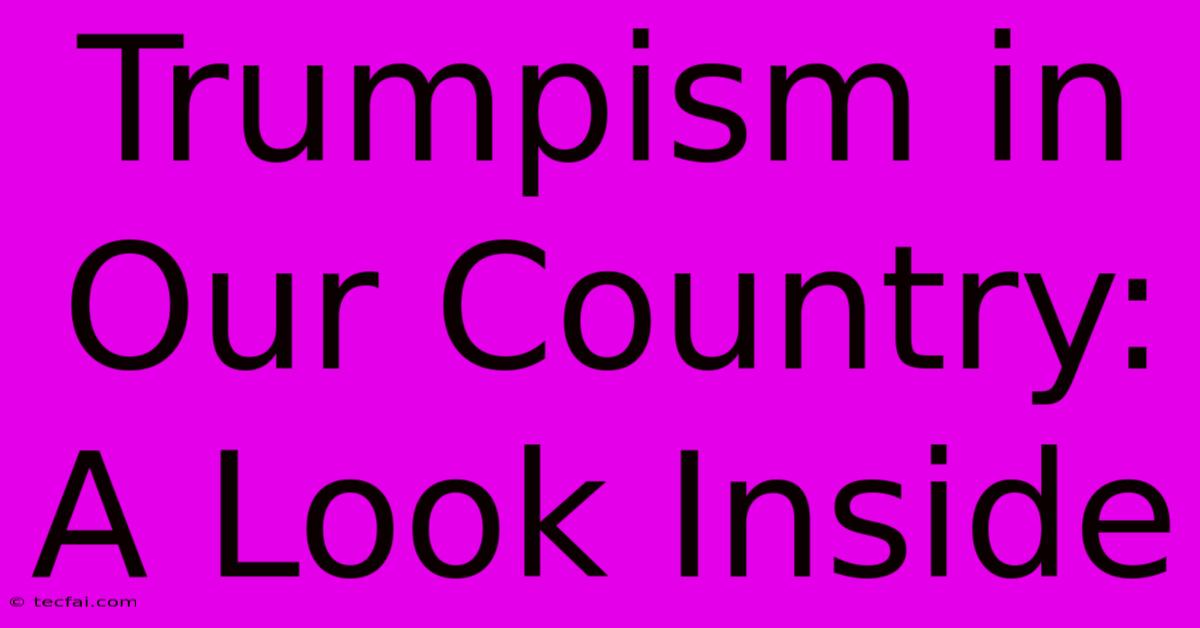Trumpism In Our Country: A Look Inside

Discover more detailed and exciting information on our website. Click the link below to start your adventure: Visit Best Website tecfai.com. Don't miss out!
Table of Contents
Trumpism in Our Country: A Look Inside
Trumpism, a term encompassing the political ideology and movement associated with former President Donald Trump, has profoundly impacted the American political landscape. Understanding its tenets, influence, and implications is crucial for navigating the current political climate. This article delves into the core principles of Trumpism, examines its effects on various aspects of American society, and explores its potential future trajectory.
Core Tenets of Trumpism: More Than Just a Personality Cult
While often perceived as a personality cult centered around Donald Trump himself, Trumpism represents a more complex ideology with several key tenets:
- Populism and Nationalism: A strong emphasis on prioritizing the interests of the common person against the perceived elite and a focus on national interests above international cooperation. This often manifests as skepticism toward international agreements and a prioritization of domestic manufacturing and jobs.
- Economic Nationalism: Advocating for protectionist trade policies, aiming to shield American businesses and workers from foreign competition through tariffs and other restrictions. This often clashes with the principles of free trade and globalization.
- Law and Order: A tough-on-crime approach emphasizing strong enforcement of existing laws and a more assertive stance on border security and immigration. This often includes calls for stricter penalties for criminal offenses.
- Cultural Conservatism: A focus on traditional values and a resistance to perceived progressive social movements. This often involves debates around issues like abortion, LGBTQ+ rights, and gender identity.
- Anti-Establishment Sentiment: A deep distrust of established political institutions, mainstream media, and the perceived "swamp" of Washington D.C. This fuels a sense of outsider status and a rejection of conventional political norms.
The Impact of Trumpism: Ripples Across American Society
Trumpism's influence extends far beyond the Republican Party, impacting various aspects of American life:
Political Polarization: A Nation Divided?
The rise of Trumpism has exacerbated existing political divisions, creating a deeply polarized society. The rhetoric employed often fuels partisan conflict and makes bipartisan cooperation increasingly difficult. This polarization is reflected in everything from political debates to social interactions.
The Media Landscape: Truth and "Fake News"
Trumpism has significantly altered the media landscape, with frequent accusations of "fake news" and attacks on the credibility of mainstream media outlets. This has led to increased distrust in traditional news sources and a rise in alternative media sources, often with partisan agendas. Discerning reliable information has become a crucial skill in the current environment.
The Future of the Republican Party: A Transformation?
Trumpism has reshaped the Republican Party, pushing it further to the right on many issues. The party's future direction remains uncertain, with ongoing internal debates about its identity and ideological direction. The influence of Trump and his followers will undoubtedly continue to shape the party's trajectory for years to come.
Looking Ahead: The Enduring Legacy of Trumpism
The long-term impact of Trumpism on American politics and society remains to be seen. While its future is uncertain, its influence on the political discourse and the broader cultural landscape is undeniable. Understanding its core tenets and impact is vital for anyone seeking to engage in informed political participation and civic discourse. The ongoing debates surrounding Trumpism highlight the need for critical thinking, fact-checking, and a commitment to respectful dialogue across ideological divides. Only through such efforts can we hope to navigate the complex political realities shaped by this significant movement.

Thank you for visiting our website wich cover about Trumpism In Our Country: A Look Inside. We hope the information provided has been useful to you. Feel free to contact us if you have any questions or need further assistance. See you next time and dont miss to bookmark.
Featured Posts
-
Maras Statement On Daniel Jones
Nov 23, 2024
-
New Kendrick Lamar Album Gnx
Nov 23, 2024
-
Calgary Snow Warning Drivers Beware
Nov 23, 2024
-
New Jfk Assassination Details Surface
Nov 23, 2024
-
Jury Rules On Mc Gregor Sexual Assault Case
Nov 23, 2024
